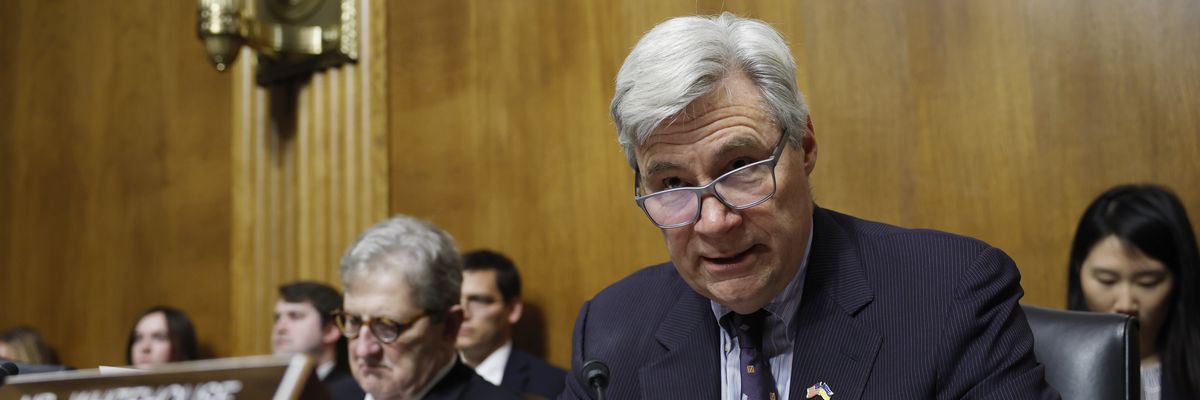Announcing a probe into potential efforts by fossil fuel companies to illegally coordinate with international oil producers in order to fix prices, U.S. Sen. Sheldon Whitehouse on Wednesday wrote to 18 oil giants
demanding that they turn over communications with the Organization of Petroleum Exporting Countries, commonly known as OPEC.
Whitehouse (D-R.I.)
wrote to companies including ExxonMobil, Chevron, and ConocoPhillips in his capacity as chairman of the Senate Budget Committee, weeks after the Federal Trade Commission (FTC) accused the former CEO of Pioneer Natural Resources Company of attempting to collude with OPEC.
Text messages, WhatsApp communications, and records from in-person meetings showed that Scott Sheffield tried to collude with representatives of OPEC countries to manipulate oil and gas production worldwide and raise oil and gas prices.
The commission made its discovery while reviewing a plan by ExxonMobil to acquire Pioneer in a $64.5 billion deal.
"The FTC's findings indicate that Sheffield and Pioneer may not have been the only individual or entity engaging in such collusive activities," wrote Whitehouse to the 18 oil giants, citing numerous examples.
"We're talking $500-1000 dollars of extra cost per year to Americans through direct and indirect effects of this conspiracy."
"In view of the findings against Sheffield, I seek to understand whether other oil producers operating in the United States may also have been coordinating with OPEC and OPEC+ representatives concerning oil production output, crude oil prices, and the relationship between the production and pricing of oil products," said Whitehouse.
Whitehouse called on the companies to provide communications between and among companies' corporate and affiliate officers and members of the OPEC Secretariat and OPEC+ concerning oil production output, crude oil prices, and the relationship between the production and pricing of oil products, dating from January 1, 2020 through the present.
The companies have until July 12 to provide the materials, the senator said.
Whitehouse noted that efforts by Sheffield and, potentially, other oil executives, to illegally coordinate oil production and prices with OPEC, may have had major, tangible effects on American families. He cited an analysis by the American Economic Liberties Project which
found that "crude oil price-fixing schemes may have caused over 25% of the increase in inflation that hurt so many American families throughout 2021 in the wake of the Covid-19 pandemic."
"Since the U.S. consumes 7 billion barrels of oil annually, the amount saved by shale oil drillers during their price war with OPEC was $140 billion to $210 billion a year," wrote Matt Stoller, the group's research director.
"Once that price war ended, presumably so did the savings," Stoller continued. "The cost itself is likely a lot higher because pulling shale off the market when demand spiked probably caused prices to increase by much more than $20-30 a barrel. Anyway, we're talking $500-1000 dollars of extra cost per year to Americans through direct and indirect effects of this conspiracy. This cost shows up most obviously in the form of more expensive gas, but higher oil prices increase the price of everything right down to potato chips because of gas being a primary cost in distribution of goods and services. For a family of four, that's two to four thousand dollars a year in higher costs."
Whitehouse wrote in his letter to the oil company that he was "concerned about the possibility that oil and gas companies could be engaging in collusive, anti-competitive activities with OPEC+ that would raise crude oil prices, resulting in higher costs not only for American families, but also for the U.S. government when it acquires crude oil for the Strategic Petroleum Reserve."
